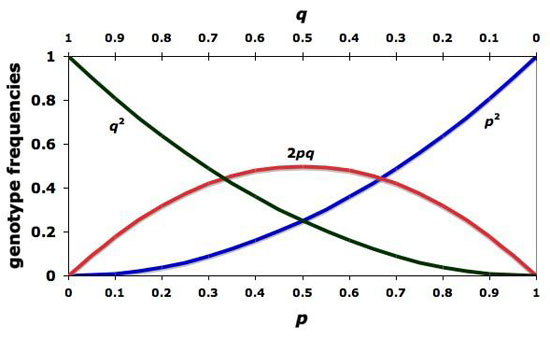Hardy-Weinberg Equilibrium
- evolution as a result of changing gene frequencies (frequency of a particular allele) within a population
Gene pool only stable when:
1. The population is very large
2. There are no mutations that affect the gene pool
3. Mating between individuals in the population is random
4. there is no net migration of individuals into or out of the population
5. The genes in the population are all EQUALLY successful at reproducing
p2 + 2pq + q2 = 1
p + q = 1
p2 = frequency of TT (dominant homozygotes)
2pq = frequency of Tt (heterozygotes)
q2 = frequency tt (recessive homozygotes)
Cross between 2 heterozygotes:
| | p = .80 (T) | q = .20 (t) |
| p = .80 (T) | (p2 = .64) TT = 64% | (pq = .16) Tt = 16% |
| q = .20 (t) | (pq = .16) Tt = 16% | (q2 = .04) tt = 4% |
The gene frequencies of F1 generation can be calculated as follows:
64%TT = 64% T allele + 0% t allele
32% Tt = 16% T allele + 16% t allele
4% tt = 0% T allele + 4% t allele
Gene freq = 80% T allele + 20% t allele
Thus, p = .80 and q = .20. These frequencies are the same as those in the parent generation, thus demonstration H-W equilibrium in a non-evolving population. (However, this does not exist in nature!)

Directional Selection: Organisms must adapt to a changing environment, so produces an adaptive change over time which increases the proportion of individuals with an extreme phenotype (ex: DDT-resistant mosquitoes).
Stabilizing Selection: Eliminates deviations from the norm & reduces frequency of extreme phenotypes by maintaining a well-adapted population, uniform in character.
Disruptive Selection: Favors BOTH phenotypic extremes, leading to the existence of 2 or more phenotypic forms within a population (polymorphism).

Microevolution
Natural Selection: Genotypes with favorable variations are selected through natural selection, and the frequency of favorable gene increases within the gene pool.
Mutation: Gene mutations change allele frequencies in a population, shifting gene equilibria.
Assorting Mating: If mates are not randomly chosen, but rather selected according to criteria such as phenotypes and proximity, the relative genotype ratios will be affected, and will depart from the predictions of the Hardy-Weinberg equilibrium. On the average, the allele frequencies in the gene pool remain unchanged.
Genetic Drift: Genetic drift refers to changes in the composition of the gene pool due to chance. Genetic drift tends to be more pronounced in small populations, where it is sometimes called the founder effect.
Gene Flow: Migration of individuals between populations will result in a loss or gain of genes, and thus change the composition of a population’s gene pool.
No comments:
Post a Comment